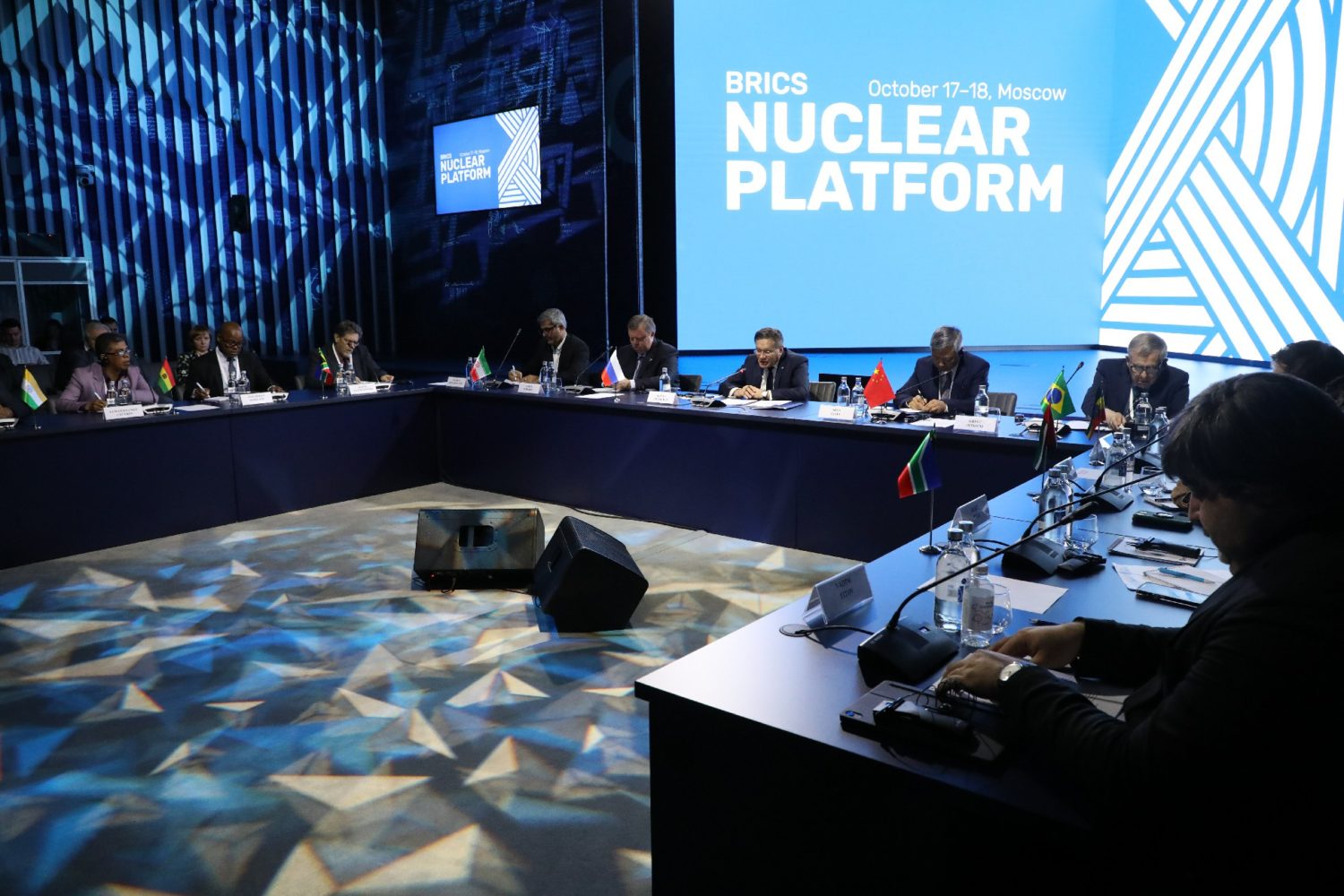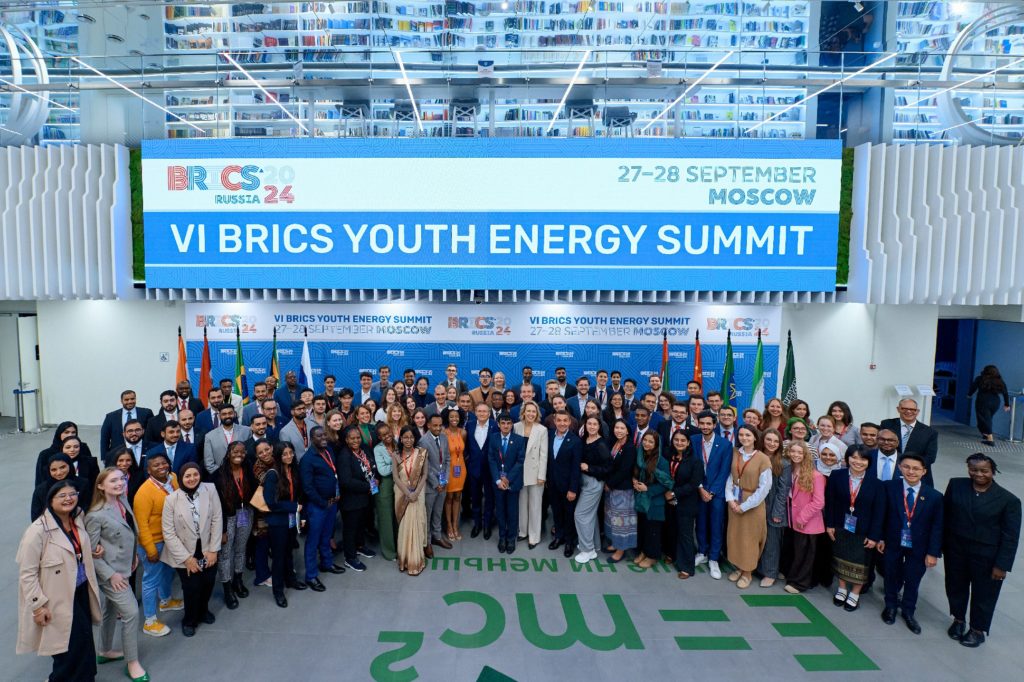
BRICS Backs Up Nuclear
back to contentsNuclear technology was one of the topics at the BRICS Summit held in Kazan this October. The heads of Russia, Turkey, Iran and Egypt discussed the construction of nuclear power plants, while Rosatom Director General Alexey Likhachev commented on the nuclear projects in India and Egypt. Rosatom also took part in the industry-specific events held before the summit.
Construction works continue
The Russian and Turkish Presidents, Vladimir Putin and Recep Tayyip Erdogan, discussed the progress of the Akkuyu NPP project. “The construction of Turkey’s first nuclear power plant at Akkuyu is our joint flagship project. Building works are going on round the clock, simultaneously at each of the four power units,” Vladimir Putin said.
At a meeting with Iranian President Masoud Pezeshkian, Vladimir Putin named cooperation around the Bushehr NPP among the priorities of the two countries.
Another large-scale project, El Dabaa nuclear power plant in Egypt, was the subject of discussion between the Russian and Egyptian presidents. “We highly appreciate the rapid evolution of our bilateral relations since we signed a strategic partnership agreement in 2018, particularly in terms of implementing major projects,” said Egyptian leader Abdel Fattah Al-Sisi.
Rosatom chief Alexey Likhachev pointed out in an interview with Rossiya 1 TV channel that the Western sanctions had not had any substantial impact on the delivery of the El Dabaa project. “The will of the Egyptian leadership and, I believe, the Egyptian people to implement this project is as high as we are enthusiastic about this epochal task, so we are finding solutions,” Alexey Likhachev commented on the construction progress. He also outlined the prospects for the Kudankulam NPP in India: “Two units are already in commercial operation, while another two units are in the final construction phase. We expect them to be commissioned in 2025–2026.”
Nuclear platform
A week before the summit, the heads of major nuclear companies and organizations of the BRICS member states discussed a new nuclear platform initiative that might have a far-reaching effect on the global nuclear industry. Alexey Likhachev gave an insight into the new association: “Virtually every BRICS member is working on nuclear energy projects. Many member states are technology drivers in today’s international nuclear market. That is why we propose to join efforts under the BRICS Nuclear Platform, a voluntary alliance of companies, professional nuclear communities and NGOs supporting the development and deployment of nuclear technologies,” Alexey Likhachev said.
The primary goal of the platform is to introduce and promote best practices and advanced approaches in the energy and non-energy applications of civil nuclear technology in the BRICS and BRICS+ markets, and to develop mechanisms and models that would stimulate nuclear projects.
According to the IAEA, there are 440 power reactors with a total capacity of about 395 GW operating in the world, and another 63 units with a total capacity of 66.1 GW are under construction. As estimated by Russian experts, the BRICS countries will account for at least half of the world’s power production and consumption by 2050. Nuclear will make up a sizable portion of the energy mix of the BRICS countries as they will account for at least two thirds of nuclear capacity additions by 2030.
 Mr. Orpet Peixoto, Deputy Chairman of the Supervisory Board of the Brazilian Association for the Development of Nuclear Activities (ABDAN), expressed confidence that the new platform would benefit every member of the association. He cited Brazil as an example. “We are one of the few countries that have all the components of the nuclear fuel cycle. But we need support, we need funding, and we know that we can get it through cooperation with the BRICS countries. The new platform opens up great opportunities for us,” Orpet Peixoto said.
Mr. Orpet Peixoto, Deputy Chairman of the Supervisory Board of the Brazilian Association for the Development of Nuclear Activities (ABDAN), expressed confidence that the new platform would benefit every member of the association. He cited Brazil as an example. “We are one of the few countries that have all the components of the nuclear fuel cycle. But we need support, we need funding, and we know that we can get it through cooperation with the BRICS countries. The new platform opens up great opportunities for us,” Orpet Peixoto said.
Other areas of focus
Rosatom is an active contributor to many of the BRICS events. In October, Rosatom representatives took part in the BRICS Scientific and Educational Congress on Ecology and Climate Change. Professional training was among the topics discussed at the Congress.
In September, Alexey Likhachev spoke at the 4th BRICS Youth Energy Summit to give a lecture on Russia’s contribution to the energy sector of the BRICS countries. “The overarching challenge we have to overcome on our path to energy transition is to introduce more carbon-free power sources into the global energy mix. And nuclear power will definitely play a key role there,” he said.
At a meeting between communications ministers at the BRICS Digital Forum held in Russia’s Innopolis, the Russian party presented the University of Future Technologies, an international research and educational center for the development of quantum and biomedical technologies and new materials. Rosatom is one of the founders of the university.
In June, Russia’s nuclear fleet operator Atomflot hosted representatives of the BRICS Ocean and Polar Science and Technology Working Group at its base in Murmansk. They visited GlavSevmorput, Rosatom’s Marine Operations Headquarters, to learn about the technology used in nuclear icebreakers and discussed an environmental monitoring and research program for the Northern Sea Route and Arctic territories.
A forum on nuclear medicine was held in the same month, followed by setting up a ministerial working group on nuclear medicine in October. The group is tasked with improving cooperation in the production of radiopharmaceuticals and diagnostics. Rosatom was among the organizers of the event.
Context
The BRICS Summit hosted a high-level discussion of the climate agenda, investments, e-commerce, food security, and other strategic partnership issues. Vladimir Putin called for intensifying cooperation in technology, education, efficient resource management, trade, logistics, finance and insurance, and for multiplying capital investments, and suggested creating a new BRICS investment platform to support national economies.




